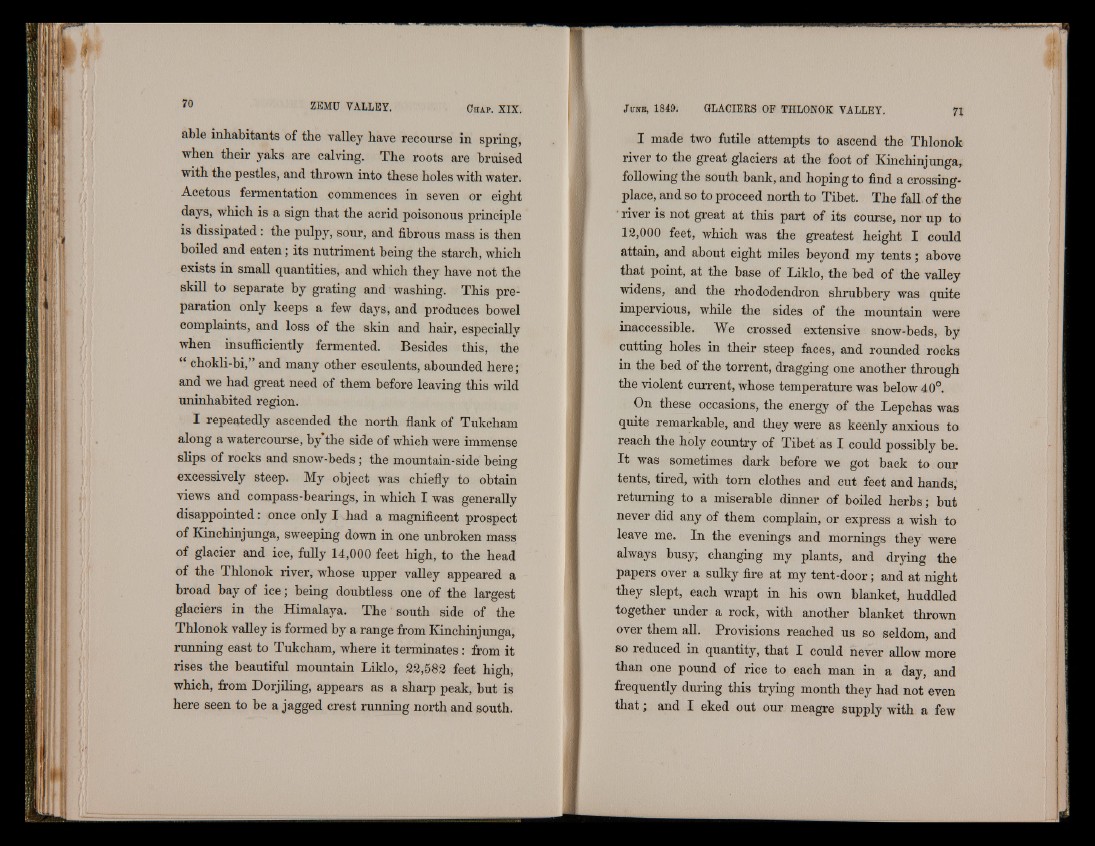
able inhabitants of the valley have recourse in spring,
when their yaks are calving. The roots are bruised
with the pestles, and thrown into these holes with water.
Acetous fermentation commences in seven or eight
days, which is a sign that the acrid poisonous principle
is dissipated: the pulpy, sour, and fibrous mass is then
boiled and eaten; its nutriment being the starch, which
exists in small quantities, and which they have not the
skill to separate by grating and washing. This preparation
only keeps a few days, and produces bowel
complaints, and loss of the skin and hair, especially
when insufficiently fermented. Besides this, the
“ chokli-bi,” and many other esculents, abounded here;
and we had great need of them before leaving this wild
uninhabited region.
I repeatedly ascended the north flank of Tukcham
along a watercourse, by the side of which were immense
slips of rocks and snow-beds; the mountain-side being
excessively steep. My object was chiefly to obtain
views and compass-bearings, in which I was generally
disappointed: once only I had a magnificent prospect
of Kinchinjunga, sweeping down in one unbroken mass
of glacier and ice, fully 14,000 feet high, to the head
of the Thlonok river, whose upper valley appeared a
broad bay of ice ; being doubtless one of the largest
glaciers in the Himalaya. The south side of the
Thlonok valley is formed by a range from Kinchinjunga,
running east to Tukcham, where it terminates: from it
rises the beautiful mountain Liklo, 22,582 feet high,
which, from Dorjiling, appears as a sharp peak, but is
here seen to be a jagged crest running north and south.
I made two futile attempts to ascend the Thlonok
river to the great glaciers at the foot of Kinchinjunga,
following the south bank, and hoping to find a crossing-
place, and so to proceed north to Tibet. The fall of the
river is not great at this part of its course, nor up to
12,000 feet, which was the greatest height I could
attain, and about eight miles beyond my te n ts ; above
that point, at the base of Liklo, the bed of the valley
widens, and the rhododendron shrubbery was quite
impervious, while the sides of the mountain were
inaccessible. We crossed extensive snow-beds, by
cutting holes in their steep faces, and rounded rocks
in the bed of the torrent, dragging one another through
the violent current, whose temperature was below 40°,
On these occasions, the energy of the Lepchas was
quite remarkable, and they were as keenly anxious to
reach the holy country of Tibet as I could possibly be.
I t was sometimes dark before we got back to our
tents, tired, with torn clothes and cut feet and hands,
returning to a miserable dinner of boiled herbs; but
never did any of them complain, or express a wish to
leave me. In the evenings and mornings they were
always busy; changing my plants, and drying the
papers over a sulky fire at my tent-door; and at night
they slept, each wrapt in his own blanket, huddled
together under a rock, with another blanket thrown
over them all. Provisions reached us so seldom, and
so reduced in quantity, that I could never allow more
than one pound of rice to each man in a day, and
frequently during this trying month they had not even
th a t; and I eked out our meagre supply with a few